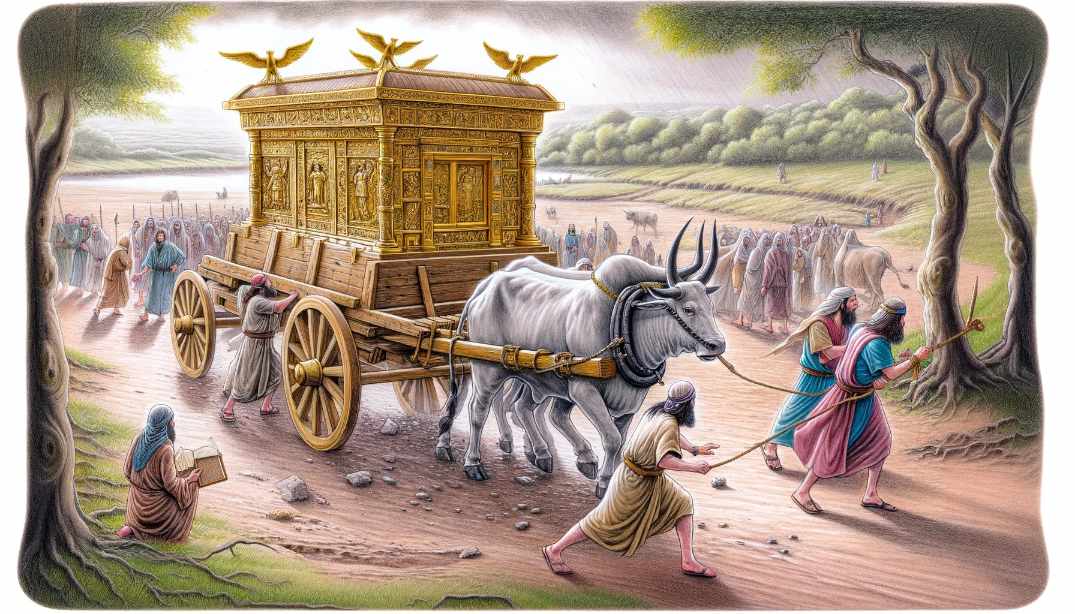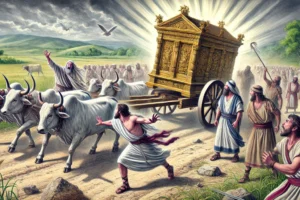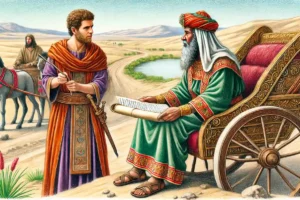
Uzzah and the Ark
Uzzah and the Ark is a sobering event recorded in the Old Testament, specifically in 2 Samuel 6:6-7. It highlights the importance of reverence and obedience to God’s instructions regarding holy objects.
Quick Facts
- Location: Near the threshing floor of Nacon.
- Context: King David was transporting the Ark of the Covenant to Jerusalem.
- Incident: Uzzah touched the Ark to steady it when the oxen stumbled.
- Outcome: God struck Uzzah dead for his irreverence.
- Significance: Emphasizes the holiness of God and the necessity of following His commands precisely.
Detailed Analysis: Uzzah and the Ark
Context and Background
The event involving Uzzah and the Ark of the Covenant is recorded in 2 Samuel 6:1-7 and 1 Chronicles 13:9-12. The Ark of the Covenant was the most sacred artifact of the Israelites, representing the presence of God among His people. It contained the stone tablets of the Ten Commandments, Aaron’s rod, and a pot of manna (Hebrews 9:4). The Ark was kept in the Holy of Holies within the Tabernacle and later the Temple.
The Event
King David, desiring to bring the Ark to Jerusalem, organized a grand procession. The Ark was placed on a new cart driven by Uzzah and his brother Ahio, sons of Abinadab, in whose house the Ark had been stored for years. As they transported the Ark, the oxen pulling the cart stumbled near the threshing floor of Nacon (also called Chidon). Instinctively, Uzzah reached out to steady the Ark and was immediately struck dead by God.
Theological Insights
- Holiness of God: The incident underscores the absolute holiness of God. The Ark was not merely a symbol but the tangible presence of God’s holiness. According to the Law, only Levites were to carry the Ark, and it was to be transported using poles inserted through rings on its sides (Exodus 25:14-15). By placing the Ark on a cart, David and the priests disregarded these clear instructions, inadvertently leading to Uzzah’s death.
- Human Presumption: Uzzah’s act, though seemingly well-intentioned, reflected a presumption about how humans can interact with the divine. His death was a powerful reminder that approaching God and His holy objects required utmost reverence and strict adherence to His commands.
- Divine Justice: The immediate consequence of Uzzah’s action reveals God’s justice. It may appear harsh, but it served as a stark reminder to the Israelites about the seriousness of God’s holiness and their need to obey His commandments without deviation.
- David’s Reaction: David’s initial anger and subsequent fear (2 Samuel 6:8-9) illustrate the human struggle to comprehend divine holiness and justice. This incident led David to reflect deeply on how to properly honor and worship God.
Significance for Believers
For contemporary believers, this event serves as a cautionary tale about the importance of reverence in worship and the need to adhere to God’s instructions carefully. It challenges believers to reflect on their approach to holy things and the presence of God in their lives.
In the broader narrative of Scripture, the story of Uzzah and the Ark points to the necessity of approaching God through the means He provides. Under the New Covenant, Jesus Christ is the mediator through whom believers have access to God, emphasizing grace and reverence in the relationship with the divine.
Conclusion
The event of Uzzah and the Ark is a powerful testament to the holiness of God and the importance of obedience. It calls believers to a deeper reverence for God, recognizing the serious nature of His commandments and the privilege of His presence. The story is a sobering reminder that God’s ways are to be followed with precision and respect, reflecting the awe and reverence due to Him.



